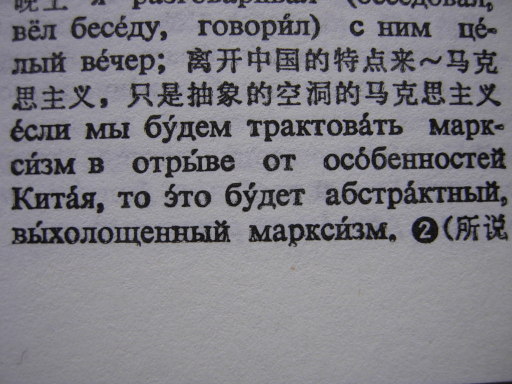If we treat Marxism disregarding China's pecularities
Posted on May 12, 2015 by Dima
Model theory: algebraically closed fields and compact complex manifolds
Posted on August 28, 2012 by Dima(this post is from an old blog, covering basics of model-theoretic dimension, and quantifier elimination for two most basic structures studied in geometric model theory: algebraically closed fields and compact complex manifolds. If I wrote this post today I would have chosen a different notation, and would have chosen a different perspective. )
I take a pragmatic stance and fix some “monster model” \(\operatorname{\mathcal{M}}\) which is simply a \(2^{2^{\aleph_0}}\)-saturated model, say (should be enough for doing model theory in any structure related to geometry, it seems); definable sets are subsets of \(\operatorname{\mathcal{M}}\) (they are denoted with blackboard bold font: \(\operatorname{\mathbb{D}}, \operatorname{\mathbb{E}}, \operatorname{\mathbb{F}}, \operatorname{\mathbb{G}}, \ldots\)). I also write \([\varphi]\) for the set of points defined by \(\varphi\) in \(\operatorname{\mathcal{M}}\), and \([\varphi]_a\) for \(\varphi(\operatorname{\mathcal{M}},a)\).
\(\omega\)-stable theories
Definition. (Morley rank) Let \(\varphi\) be a definable set and let \(M\) be a model that contains the parameters of \(\varphi\). The Morley rank of \(\varphi\) with respect \(M\) is defined inductively defined as follows:
- \(\operatorname{MR}^M(\varphi) \geq 0\) if \(\varphi(M) \neq \emptyset\);
- \(\operatorname{MR}^M(\varphi) \geq \alpha + 1\) if there exists infinitely many formulas \(\psi_i, [\psi] \subset [\varphi]\) defined over \(M\) such that \([\psi_i] \cap [\psi_j] = \emptyset\) and such that \(\operatorname{MR}^M(\psi_i)\geq \alpha\);
- \(\operatorname{MR}^M(\varphi)\geq \alpha\) for a limit ordinal \(\alpha\), if there for any \(\beta < \alpha\) there exists definable set \(\psi, [\psi] \subset [\varphi]\) such that \(\operatorname{MR}^M(\psi) \geq \beta\);
Finally, \(\operatorname{MR}^M(\varphi) = \alpha\) if \(\operatorname{MR}^M(\varphi) \geq \alpha\) but not \(\operatorname{MR}^M(\varphi) \geq \alpha + 1\). Morley rank of a definable set is not defined if \(\operatorname{MR}^M(\varphi) \geq \alpha\) for any ordinal.
If \(M=\operatorname{\mathcal{M}}\), then one omits “with respect to \(\operatorname{\mathcal{M}}\)” and talks just about “Morley rank”, denoted \(\operatorname{MR}(\varphi)\).
Let \(\operatorname{\mathbb{D}}\) be a definable set of Morley rank \(\alpha\). There exists the maximal number of disjoint sets of Morley rank \(\alpha\) into which \(\operatorname{\mathbb{D}}\) can be decomposed (if there is no bound, one can construct an infinite tree of nested definable subsets of rank \(\alpha\), effectivly contradicting that the Morley rank of \(\operatorname{\mathbb{D}}\) is \(\alpha\); I omit the details). It is called the of \(\operatorname{\mathbb{D}}\) .
Read more (comments)